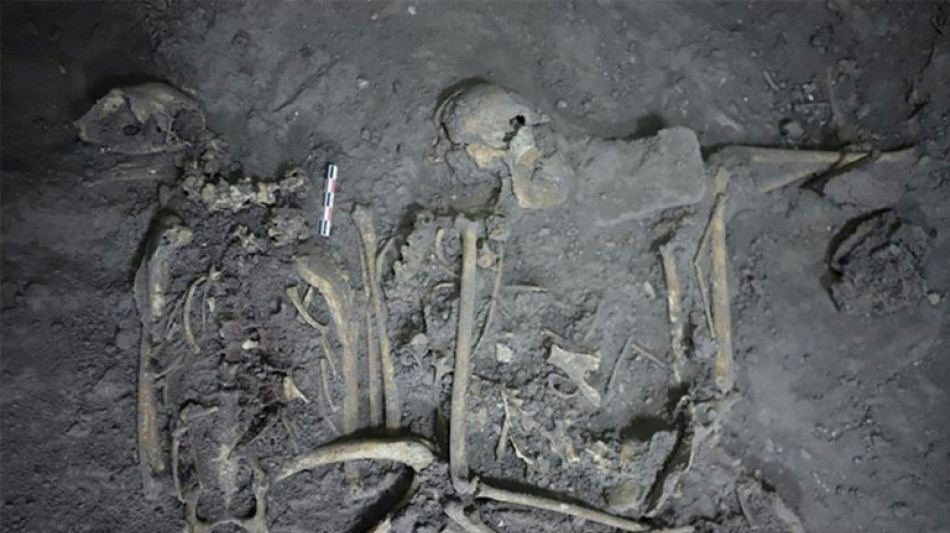
-
 Malinin wilts at Olympics as Heraskevych loses ban appeal
Malinin wilts at Olympics as Heraskevych loses ban appeal
-
Bhatia joins Hisatsune in Pebble Beach lead as Fowler surges

-
 Malinin meltdown hands Shaidorov Olympic men's figure skating gold
Malinin meltdown hands Shaidorov Olympic men's figure skating gold
-
Top seed Fritz makes ATP Dallas semis with fantastic finish

-
 Patriots star receiver Diggs pleads not guilty to assault charges
Patriots star receiver Diggs pleads not guilty to assault charges
-
Havana refinery fire under control as Cuba battles fuel shortages

-
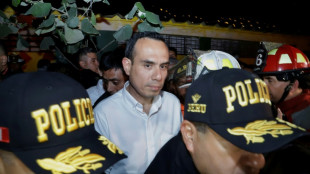 Peru Congress to debate impeachment of interim president on Tuesday
Peru Congress to debate impeachment of interim president on Tuesday
-
Snowboard veteran James targets 2030 Games after Olympic heartbreak

-
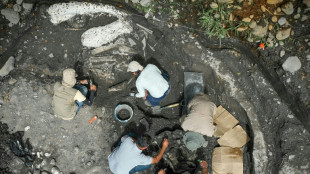 Costa Rica digs up mastodon, giant sloth bones in major archaeological find
Costa Rica digs up mastodon, giant sloth bones in major archaeological find
-
Trump says change of power in Iran would be 'best thing'
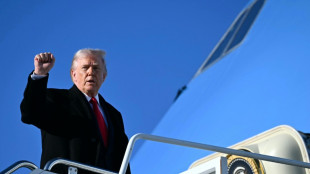
-
 Ukrainian skeleton racer Heraskevych loses appeal against Olympic ban
Ukrainian skeleton racer Heraskevych loses appeal against Olympic ban
-
Paris police shoot dead knife man at Arc de Triomphe

-
 Japan's Totsuka wins Olympic halfpipe thriller to deny James elusive gold
Japan's Totsuka wins Olympic halfpipe thriller to deny James elusive gold
-
Canada's PM due in mass shooting town as new details emerge
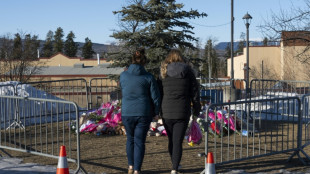
-
 Neto treble fires Chelsea's FA Cup rout of Hull
Neto treble fires Chelsea's FA Cup rout of Hull
-
Arbitrator rules NFL union 'report cards' must stay private

-
 Dortmund thump Mainz to close in on Bayern
Dortmund thump Mainz to close in on Bayern
-
WHO sets out concerns over US vaccine trial in G.Bissau

-
 Skeleton racer Weston wins Olympic gold for Britain
Skeleton racer Weston wins Olympic gold for Britain
-
Ex-CNN anchor pleads not guilty to charges from US church protest

-
 Berlin premiere for pic on jazz piano legend Bill Evans
Berlin premiere for pic on jazz piano legend Bill Evans
-
Fire at refinery in Havana as Cuba battles fuel shortages

-
 A Friday night concert in Kyiv to 'warm souls'
A Friday night concert in Kyiv to 'warm souls'
-
PSG stunned by rampant Rennes, giving Lens chance to move top

-
 Japan's Totsuka wins Olympic halfpipe thriller as James misses out on gold
Japan's Totsuka wins Olympic halfpipe thriller as James misses out on gold
-
Indian writer Roy pulls out of Berlin Film Festival over Gaza row

-
 Conflicts turning on civilians, warns Red Cross chief
Conflicts turning on civilians, warns Red Cross chief
-
Europe calls for US reset at security talks

-
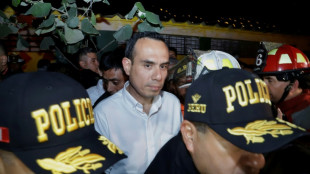 Peru leader under investigation for influence peddling
Peru leader under investigation for influence peddling
-
Rising star Mboko sets up Qatar Open final against Muchova

-
 Canada PM to mourn with grieving town, new details emerge on shooter
Canada PM to mourn with grieving town, new details emerge on shooter
-
US waives Venezuela oil sanctions as Trump says expects to visit
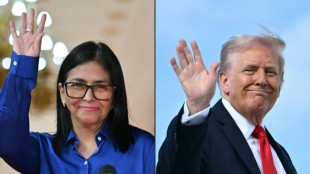
-
 NBA star Chris Paul retires at age 40 after 21 seasons
NBA star Chris Paul retires at age 40 after 21 seasons
-
WTO chief urges China to shift on trade surplus

-
 Vonn hoping to return to USA after fourth surgery on broken leg
Vonn hoping to return to USA after fourth surgery on broken leg
-
Trump sending second aircraft carrier to pile pressure on Iran

-
 Heraskevych loses Olympics disqualification appeal, Malinin eyes second gold
Heraskevych loses Olympics disqualification appeal, Malinin eyes second gold
-
Mercedes have 'taken a step back': Russell

-
 Madagascar cyclone death toll rises to 40, water, power still out
Madagascar cyclone death toll rises to 40, water, power still out
-
Earl says England inspired by last year's Calcutta Cup

-
 Stocks sluggish as AI disruption worries move to fore
Stocks sluggish as AI disruption worries move to fore
-
USA romp past Dutch in T20 World Cup to keep Super Eight hopes alive

-
 De Minaur scraps past local legend van de Zandschulp
De Minaur scraps past local legend van de Zandschulp
-
Ukrainian Heraskevych loses appeal against Olympics disqualification

-
 Ghana rallies round traditional tunic after foreign mockery
Ghana rallies round traditional tunic after foreign mockery
-
Forest set to hire former Wolves boss Pereira: reports

-
 England rugby captain Itoje slams Ratcliffe's 'ridiculous' immigration comments
England rugby captain Itoje slams Ratcliffe's 'ridiculous' immigration comments
-
Europe should speak to Russia with 'one voice', Putin foe says

-
 US Congress impasse over immigration set to trigger partial shutdown
US Congress impasse over immigration set to trigger partial shutdown
-
US to deploy new aircraft carrier to Middle East as Trump warns Iran
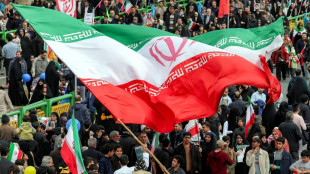

To strengthen ties, ancient Maya gifted neighbors a spider monkey
Seventeen hundred years ago, a female spider monkey was presented as a treasured gift -- and later brutally sacrificed -- to strengthen ties between two major powers of pre-Hispanic America, according to a new study.
The paper, published Monday in the Proceedings of the National Academy of Sciences (PNAS), compared the offering by Maya elites to Teotihuacan to China's panda diplomacy that accompanied the normalization of Sino-US relations in the 1970s.
By using multiple techniques -- including extraction of ancient DNA, radiocarbon dating and chemical dietary analysis -- researchers were able to reconstruct the life and death of the primate, finding she was likely between five and eight years of age when buried alive.
"It's such an exciting time to be doing archaeology because the methodology is finally here," lead author Nawa Sugiyama of the University of California, Riverside told AFP.
The work began with Sugiyama's surprising discovery in 2018 of the animal's remains in the ruins of Teotihuacan, a UNESCO World Heritage Site in the arid Mexican Highlands.
Spider monkeys (Ateles geoffroyi) aren't native to the elevated region, leaving Sugiyama with a puzzle to solve: What was the animal doing there, who brought it, and why was it sacrificed?
Vital clues came from the remains' location. Teotihuacan (pronounced tay-uh-tee-waa-kaan), which lies 30 miles (48 kilometers) northeast of Mexico City, was an important site of cultural exchange and innovation in Classic Mesoamerica.
It's perhaps best known for the pyramids of the Moon, Sun and Feathered Serpent. But there is increasing interest in another monument called Plaza of the Columns, a complex where neighboring Maya maintained a presence likened to a modern day embassy.
- Feasts, treasures and murals -
The monkey's skeletal remains were found in the complex alongside a golden eagle -- an emblem of Mexico even today -- and surrounded by a collection of high-value items, including obsidian projectile points, conch shells, and precious stone artifacts.
Over 14,000 ceramic shards from a grand feast were also discovered, as well as a Maya mural depicting the spider monkey.
This, said Sugiyama, was further evidence of an exchange that took place at the highest levels, and preceded the Teotihuacan state's later rise and military involvement in Maya cities by the year 378 CE.
Results from chemical analysis involving two canine teeth that erupted at different points in the monkey's life indicate that prior to captivity, she lived in a humid environment and ate plants and roots.
After being captured and brought to Teotihuacan her diet was closer to that of humans, including corn and chili peppers.
The spider monkey may have been "an exotic curiosity alien to the high elevations of Teotihuacan," wrote Sugiyama and colleagues, with the fact she was a fellow primate possibly adding to her charisma and appeal.
Ultimately, the animal met a grisly demise: "Hands bound behind its back and tethered feet indicate en vivo burial, common among human and animal sacrifices at Teotihuacan," the authors wrote.
Though savage to modern eyes, "we need to understand and contextualize these cultural practices... and what it meant to be able to give up that which is most precious to you," said Sugiyama.
M.AlAhmad--SF-PST

